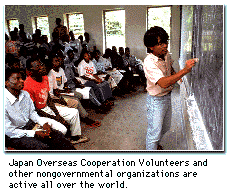 |
What sort of assistance does Japan give other countries? |
 |
 Japan offers various forms of official development assistance (ODA), considering it is natural for countries of the world to be dependent upon one another and believing from a humanitarian standpoint that economically advanced countries should assist developing ones.
Japan offers various forms of official development assistance (ODA), considering it is natural for countries of the world to be dependent upon one another and believing from a humanitarian standpoint that economically advanced countries should assist developing ones.ODA is provided in different forms. The most basic needs of the developing countries--ensuring food supply, meeting health and medical needs, and promoting activity in rural communities--are addressed through the form of grant aid that does not need to be paid back. Japan also offers long-term loans at interest rates considerably lower than those of commercial banks. This kind of funding is particularly aimed at large, expensive projects needed to help countries reach the next stage of development, such as building power plants, port facilities, and roads. Another form of assistance is dispatching personnel. In their nation-building efforts, developing countries need to acquire expertise in areas such as technology, health care and medical treatment, and education. So experts from a wide range of fields and members of the Japan Overseas Cooperation Volunteers spend a couple of years in developing countries to pass on their skills and know-how to the local residents. To date, more than 67,300 people have been dispatched. Japan has a system enabling the mobilization of international emergency assistance teams for dispatch within 24 hours of a major overseas disaster. In addition, Japan sends relief supplies to countries that have suffered natural disasters. Japanese ODA has two key characteristics: It is aimed at promoting economic growth and improving social welfare in the developing countries, and the emphasis is on helping the recipient country help itself along the road to growth, rather than simply offering money. During 1996 Japan disbursed $9.6 billion in ODA to over 150 countries and regions, assisting developing countries in their nation-building in ways that respect their own initiatives as much as possible. Photo courtesy of Ministry of Foreign Affairs. |
| Total (US$ million) | 9,435 | |
| Loans | 2,018 | |
| Technical cooperation | 3,021 | |
| Grants | 1,574 | |
| Contributions to multilateral organizations | 2,823 | |
| % of GNP | 0.22 | |
| Amount disbursed (US$ million) | Share of world total (%) | Share of GNP (%) | Amount per capita (US$) | |
| Japan | 9,358 | 19.7 | 0.22 | 75.0 |
| United States | 6,168 | 13.0 | 0.08 | 35.3 |
| France | 6,348 | 13.3 | 0.45 | 127.6 |
| Germany | 5,913 | 12.4 | 0.28 | 91.8 |
| Britain | 3,371 | 7.1 | 0.26 | 54.4 |
| Netherlands | 2,946 | 6.2 | 0.81 | 209.6 |
| Canada | 2,146 | 4.5 | 0.36 | 59.9 |
| Italy | 1,231 | 2.6 | 0.11 | 42.0 |
| Total | 47,580 | 100.0 | 0.22 | 58.2 |
Source: Ministry of Foreign Affairs.
 |
